***Editor’s note: In April of 2016, MIA made some critical comments about the Black Lives Matter movement. As she was recently announced as the headliner for the AfroPunk UK Festival, the organizers faced backlash for making her the face of the event. Consequently, her involvement is currently up in the air.***
I don’t remember the first time that I saw MIA, but I remember being in complete awe of her. I was in middle school when September 11th happened. Before, I had been an ambiguous brown; I confused people. In second grade an older girl came up to me and asked what color I was. When I didn’t have an answer, she asked “Are you black, or are you white?” I wasn’t either. I didn’t know what I was, other than Pakistani and Kashmiri, foreign places where I didn’t grow up. Everyone spoke Spanish to me as they passed on the street, and I fumbled words back to them. After September 11th, everything changed. My classmates followed me around the park with bottles in their fists. The question “where are you from” shadowed me everywhere I went. I could hear the bite, the threat behind it. I overheard my friends answering on my behalf to strangers when they thought I wasn’t listening — yeah, she’s from there, but she’s okay. She’s not a bad one.
September 11th was when I realized that I wasn’t American in the eyes of America and that I probably never would be. But if I wasn’t American, then what was I? I spent so much time in my childhood trying to convince my peers I wasn’t a FOB, that I didn’t smell like curry, that my family’s language wasn’t satanic, that our religion didn’t make us heathens, that we didn’t come from a backwards land of tribes and terrorists. And, because I was in middle school, it was at the peak of my awkward hairy phase. Without a lot of other South Asians around, my peers made fun of my full beard and mustache, and I tried to wax it off to be a more digestible brown.
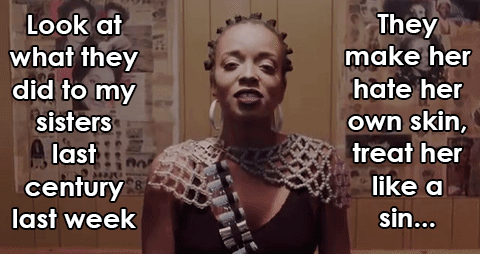
The self-hate was ingrained in my family too. I remember my auntie telling me once to not leave the house wearing chapals otherwise everyone else would think I had just arrived off the plane. We could be South Asian in the comfort of our homes, away from the eyes of others, because it was the only place we could be openly South Asian, Muslim, and safe. Once we walked out of our apartments, we were exposed to America, and America had her eyes on us.
There just weren’t that many of us out there. Okay, that’s a lie: if I actually knew how to look up and read population statistics, I could tell you how exactly how many millions of us there are. But in the media, there’s not that many of us. When we are there, we’re usually relegated to the role of Terrorist #6 or Battered Hijabi Woman In Need of American Saving #47.
So when I first saw MIA, the first South Asian star to really take over the western world, I was mesmerized. She had my skin, my hair, my traditional clothes — and she didn’t run away from any of it. She embraced it, she put it on display, she made it sexy. To this day I probably can’t name more than a few of her songs; I never particularly loved her music. But I loved her, I loved that her existence made me seen.
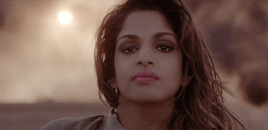
The question shifted then, when she moved into the spotlight. People hitting on me at the bus stops started asking “Are you from the same place as MIA?” And there it was — that small moment of recognition, of relateability, of someone recognizing my part of the world as something more than a hotbed of terror. And honestly, most times it was enough recognition to make me not even mad that they were hitting on me when I was really just trying to get on the bus, or go about my day. It made me feel human in a country that had stopped making me feel like I was.
[quote_left]September 11th was when I realized that I wasn’t American in the eyes of America and that I probably never would be.[/quote_left]I am older now, and not that much has changed. Because of years of waxing, I’m a little less hairy. I’m still brown, and there’s still none of us in the media. We got Priyanka Chopra this year, but the storytelling on Quantico is so basic that I’d be surprised if Hollywood ever hired another South Asian lead actress again. I still live in America, and am often not considered American. The media is still spinning tales of how all Muslims are terrorists, and there is the very real threat that come the elections this fall I might find myself in a Muslim internment camp.
And perhaps this is what being brown in America is all about: being invisible and erased until one day, someone who maybe looks like you does something bad, and there you are, in the world’s spotlight, everyone’s daggers pointed at you.
All of this is real, and I feel it every day.
It manifests in the way that I walk down the street, what I wear, how I speak, how often I decide to leave my house.
When I ask myself why do I stay in a country that so clearly hates my existence, my only answer is because I believe and have hope in the America that I have seen outside of Whiteness.
Since America was founded on Whiteness and has such a deeply embedded history with the preservation of Whiteness, an America outside of Whiteness might seem like an oxymoron. But it’s not. We see it everyday. In the hundreds, thousands, and millions of diasporic communities that live, exist, survive, and depend on each other, here, in America. Black. Latinx. Indigenous. Asian. We see it in the Black communities that welcomed South Asian immigrants when they first started arriving in this country, in the early 1900s. In the Afghan vendors who sold Mexican tamales and created enclaves of Muslim communities in Wyoming, Colorado, and South Dakota. In poetry communities across major cities. In my South Asian family bringing daal and roti to my Black friend’s family’s summer barbecues. We see it everywhere. And yes, they are not perfect spaces. But these are the spaces that I have felt most welcomed, where I can be my fullest self. These are the spaces that I’ve learned the most about organizing, about history, about healing. These are the spaces that I love, that I will fight my hardest to protect, that I would not be able to exist without.
[quote_right]I never particularly loved her music. But I loved her, I loved that her existence made me seen.[/quote_right]We do not have the same histories, we are not the same people. But how many other communities felt the same way that I did, were taught the same way that I was? That we could only be safe when we were surrounded by people who looked like us, people with brown and black skin? That white America was not safe, that we had to be careful when we entered?
It is precisely because of this lived reality that I feel such profound disgust and disappointment in MIA’s recent comments about the Black Lives Matter movement.
Though I disagree with her, I understand the root of her frustrations. MIA was born in England. England has a direct colonial relationship with South Asia. England has played a huge role in destabilizing South Asia and the Middle East, and then has the nerve to call us backwards or terrorists. I know what colonization did to my people — the lines they drew to create tensions between different ethnicities, the way they partitioned provinces across South Asia that led to ethnic cleansing, their funding of genocidal wars across the region, the famines they created, the indentured servants they stole and shipped across the world. I know how we are still living in colonialism’s shadow to this day. In America, a lot of that history is not talked about. Instead there is the false rhetoric of “model minority,” which erases the oppression and marginalization that South Asians face in America and instead tells us that we should be grateful since we are even allowed in this country, while America bombs our homelands. Even in my own community there is often latent Islamophobia or complicit attitudes towards American imperialism.
But MIA is not American. She’s not Muslim, she’s not Pakistani, she’s not Syrian. She’s not the identities that she claims are “more interesting” than American Blackness. I don’t say this to downplay her own identificaiton of the oppression her people have faced — just to say she’s speaking on behalf of identities that she does not hold, and is commenting on American politics and rhetoric without understanding or engaging with American history. MIA complains that Black Lives Matters “is nothing new” to her, is something that she’s been hearing in Hip Hop since the 80s and 90s. And yes, she’s right — Hip Hop has long been a platform to voice frustrations of marginalized voices, particularly that of Black artists. But Hip Hop was created by Black Americans.
In her comments, MIA does not contend with the fact that Hip Hop is Black culture and art, nor does she contend with the particular history of Blackness in America. She doesn’t contend with the forced displacement of many Black people to America, yet she claims to take a stand for all refugees. She claims to be for Muslim rights, but doesn’t acknowledge the fact that many Black Americans are Muslim as well. She ignores the long history of Civil Rights movements in America spearheaded by Black Americans, who have historically fought for the rights of other marginalized and immigrant groups. To not acknowledge this history while critiquing Black artists for not championing other identities in their music is problematic.
Why should MIA belittle any movement’s fight for freedom and survival? Especially a movement as necessary as Black Lives Matter. MIA’s comments are anti-Black and ignorant of history. They point to a thing that happens often among People of Color — a hierarchy of oppression and a fear around scarcity of representation and media attention. It’s the belief that if one movement is gaining traction, then that inherently means other movements, peoples, and fights for liberation are getting left behind. That because the fight for Black Lives has gained visibility, America has “excused itself” and stopped needing to make up for the violence it has caused due to its imperialism and Islamophobia.
[quote_left]They point to a thing that happens often among People of Color — a hierarchy of oppression and a fear around scarcity of representation and media attention.[/quote_left]No, MIA. You’re wrong. Look at your logic. It ignores intersecting identities and the fact that a lot of Black people in America are Muslim and face Islamophobia, and that Black people in America belong to many complicated diasporic cultures that have been affected by American imperialism and empire. It also ignores that the BLM movement’s protesters and leaders have fought for every second of visibility they have achieved in the media — that this was not something that a benevolent America granted, but was something earned, fought for, and is still misrepresented and underplayed. It ignores that while BLM might have visibility in American media, Black people are still being slaughtered by police officers on a daily basis, and the American government has yet to make substantial policy that protects Black people in this country.
Most importantly, in creating a hierarchy of oppression among People of Color, this logic is based on a false belief that our fight for liberation is not linked, and not intersectional. MIA’s comments ignore that Muslim lives are not separate from Black lives; that the ambivalence to Pakistani lives and the violence Pakistan faces from US military is similar and tied to the violence Black communities in America face from US state-sanctioned police; that Brown and Black people everywhere are being forced into slavery and poverty for the growth of American capitalism.
We have to move past mentalities that pit us against each other, and instead keep our eyes on the real enemy. It’s too easy to fall into that trap, to point at, disregard and blame each other for the obstacles in our way. MIA fell into this trap, and I thought, I hoped, she was better than that. Instead of advancing solidarity between communities of color, MIA used her comments to attack a much needed, very important movement for Black lives. I’m tired of this. Let us build together, let us make our America outside of Whiteness.
Are you following Black Nerd Problems on Twitter, Facebook, Tumblr or Google+?


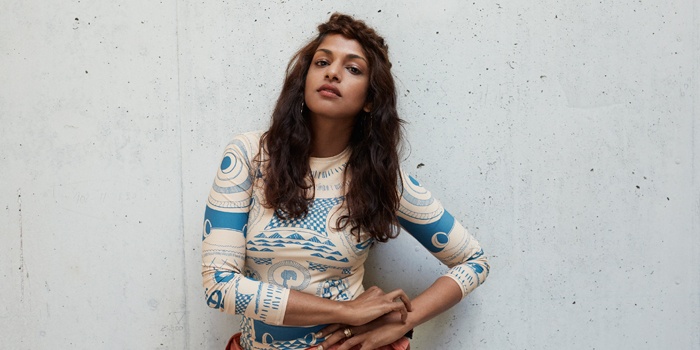
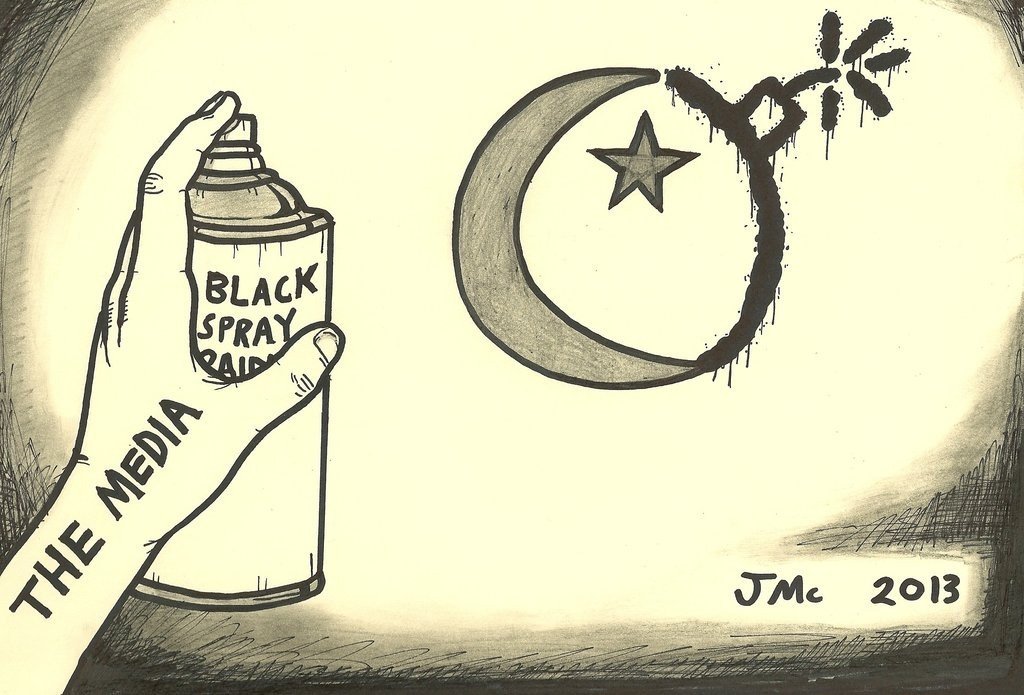
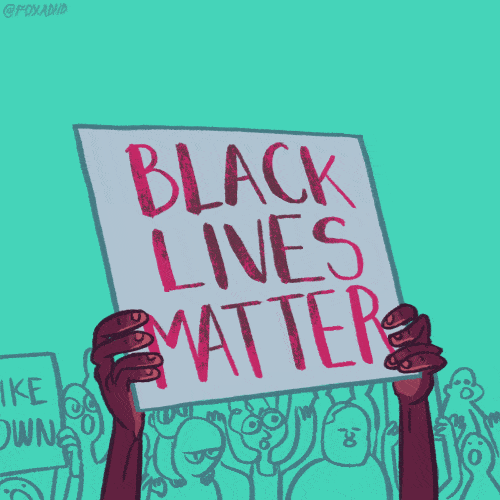
Show Comments
Tonya Love
Thank you, for sharing your story and your critique of MIA. Given the “Take our country back” movement in America and Britain, we must do what we can to encourage Black and Brown unity and stick together!
Jason Nolen
Appreciate this insight and reminder. I think we all periodically need that nudge to know that we’re not alone in the struggle. With regard to this topic specifically, I was first nudged to think about it when I first watched Mississippi Masala.
Marbella
Some very provoking thoughts. This article brings up a lot of important points in regards to supporting movements that although may not be directly linked to our own groups or identities promote equality and stimulate changing attitudes towards minorities. The fact that I am not black does not lessen the importance of the black lives matter movement or the need for there to be a black lives matter movement.
Riti Patel (@ritipaddle)
Absolutely resonates with a conversation I was having with a friend a few weeks back. As someone who identifies as an Indian American/Desi American, I was saying that we really have to work internally between minorities to build solidarity and advance equality for all minorities. This is not to discount that there is a level of privilege attached to certain races, but it is due to the competition minorities are forced to harvest to stay above one another since no one wants to end up at the bottom.
The portion about being “model minorities” also never discusses the cost at which folks become model minorities. That is to say, disassociating with our culture or heritage, pretending to become white, to achieve success.
Thank you for this enlightening post. We are in this together.
Cleojonz
I enjoyed this article. Thank you for continuing to be an ally. The thing that gets me the most with BLM is that nowhere in any of the movement does it support violence or condemn all officers but that’s the meaning attributed to it. No, just don’t harm and kill us unjustifiably and without consequence. A support of one cause does not mean condemnation of all others we don’t have to be singularly focused, we can care about more than one thing at a time, it’s so frustrating.
As for MIA she seems to always come out of pocket periodically. I wonder if it’s a ploy on her part to stay relevant.
PVR
Your article is amazing. As a first generation Haitian American I feel you on the early struggle on identity and how people of color can be as intolerant and ignorant of each other. I believe in America the same way you do. Because of that I hope I am representing against Islamophobia in the same way I represent for Black Lives Matter. I got your back.
Bathazar Xavier
thank you.
John Austin
I will simply say Thank you.